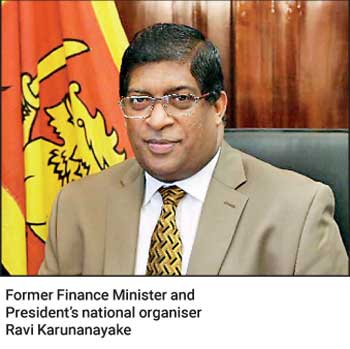Thursday Feb 27, 2025
Thursday Feb 27, 2025
Saturday, 13 July 2024 00:30 - - {{hitsCtrl.values.hits}}
 Sri Lanka is now set to implement Digital Public Infrastructure (DPI) initiative towards building a comprehensive and inclusive digital future paving the way for social and economic development across the nation, former Finance Minister and President’s national organiser Ravi Karunanayake divulged.
Sri Lanka is now set to implement Digital Public Infrastructure (DPI) initiative towards building a comprehensive and inclusive digital future paving the way for social and economic development across the nation, former Finance Minister and President’s national organiser Ravi Karunanayake divulged.
It is aimed at providing secure and accessible digital services to citizens and businesses in achieving development goals, increasing efficiency in the public sector and unlocking innovation in the private sector.
More broadly, digital transformation of the Government can improve policy implementation and widen the range of policy options.
The Government has taken a significant step towards its DPI initiative in partnership with the World Bank on the directions of President Ranil Wickremesinghe with a vision for a brighter digital future, he claimed.
This digital leap is not digitalisation of specific public services, but rather building minimal digital building blocks that can be used by the Government as well as the private sector to enable society-wide transformation.
The DPI includes a digital identification layer including a unique identification and social security number, a payments system running as a unified payment interface, a data exchange layer and other services.
Sri Lanka’s digital economy, projected to be worth $ 3.47 billion, is developing, with more than 60% of the population owning mobile phones and an increasing number of internet users.
Karunanayake noted that the ambition of the President is to create a technology-driven society, with a concentration on digital based governance, economy, and society at least by the year 2030. Sri Lanka may not be able to compete immediately in artificial intelligence (AI) and autonomous vehicles, but it shows potential in e-commerce and fintech, he said, adding that the Government is gearing up to incorporate effective ways to meet digital economy goals.
Foundational digital public infrastructure (DPI), which includes unique digital identification, a payment system, and a data exchange layer, has the capability to transform the economy and promote inclusive growth.
Sri Lanka’s foundational DPI, has been utilised to encourage innovation and competition, expand markets, address financial inclusion gaps, increase Government revenue collection, and enhance the efficiency of public spending, he revealed.
The Government will make use of DPI to efficiently manage the social welfare program which is being implemented to alleviate poverty in the island, he added.
Poverty rates continued to rise for the fourth year in a row, with an estimated 25.9% of Sri Lankans living below the poverty line in 2023.
Labour force participation has also seen a decline, particularly among women and in urban areas, aggravated by the closure of micro, small, and medium-scale enterprises (MSMEs).
Households are grappling with multiple pressures from high prices, income losses, and under employment. This has led to households taking on debt to meet food requirements and maintain spending on health and education. Poverty rates are anticipated to remain above 22% until 2026.
In the first four months of 2024, the Government has incurred Rs. 152.8 billion on social welfare and social security including household subsidies of Aswesuma, and other social welfare activities, Finance Ministry data showed.
Social security expenditure on Aswesuma and cash grants provided to low-income families in the first four months of 2024 amounted to Rs. 46 billion. An allocation of Rs. 205 billion is made for the expenditure for the Aswesuma and other categorical household cash grants for 2024.
Apart from the use of DPI to efficiently manage social security expenditure, customs inland revenue and excise department’s revenue collection, it helps Sri Lanka build an equitable tax system by streamlining filings, improving data collection, and enhancing transparency, he added.
Discover Kapruka, the leading online shopping platform in Sri Lanka, where you can conveniently send Gifts and Flowers to your loved ones for any event including Valentine ’s Day. Explore a wide range of popular Shopping Categories on Kapruka, including Toys, Groceries, Electronics, Birthday Cakes, Fruits, Chocolates, Flower Bouquets, Clothing, Watches, Lingerie, Gift Sets and Jewellery. Also if you’re interested in selling with Kapruka, Partner Central by Kapruka is the best solution to start with. Moreover, through Kapruka Global Shop, you can also enjoy the convenience of purchasing products from renowned platforms like Amazon and eBay and have them delivered to Sri Lanka.
Discover Kapruka, the leading online shopping platform in Sri Lanka, where you can conveniently send Gifts and Flowers to your loved ones for any event including Valentine ’s Day. Explore a wide range of popular Shopping Categories on Kapruka, including Toys, Groceries, Electronics, Birthday Cakes, Fruits, Chocolates, Flower Bouquets, Clothing, Watches, Lingerie, Gift Sets and Jewellery. Also if you’re interested in selling with Kapruka, Partner Central by Kapruka is the best solution to start with. Moreover, through Kapruka Global Shop, you can also enjoy the convenience of purchasing products from renowned platforms like Amazon and eBay and have them delivered to Sri Lanka.